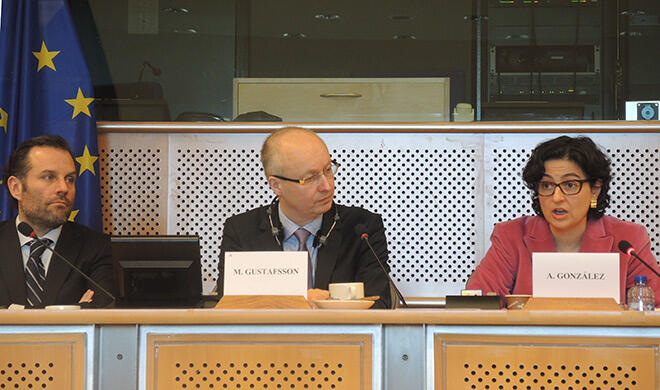
L'autonomisation économique des femmes est la clef de la réduction de la pauvreté(en)
The economic empowerment of women can contribute to eliminating poverty, said the Executive Director of the International Trade Centre (ITC), Arancha González. She added that efforts must be made to include women in consultations aimed at improving economic and human development by enabling them to play a role in crafting and implementing solutions to issues. She urged the European Parliament to play a role in advancing opportunities for women by working with trade and development commissions in directing a greater part of its Aid for Trade initiative towards the economic empowerment of women.
Speaking to the FEMM Committee at the European Parliament in Brussels on 20 March 2014, Ms González said: ‘Gender-equality focused aid is concentrated in the social sectors of education and health, with alarmingly low levels of aid targeted towards economic sectors. Only two per cent of aid to the economic and productive sectors target gender equality as its principle objective. We need robust accountability systems in place to track support to women’s economic empowerment. We see clearly the need not only to ensure women’s economic success but to better think through and find solutions that help women retain control over financial resources.’
Ms González pointed out that women-owned small and medium-sized enterprises (SMEs) suffer greater difficulties in access to finance and savings facilities than men. She said solutions need to be found to assist women in gaining access to commercial lines of credit and savings facilities.
‘The degree to which women can spend money on their families and communities depends on the control they have over financial resources. If the money is taken by men, as is common in many regions where we work, the social dividends of women’s economic activities are largely curtailed.’
The Executive Director stated that assistance must be given build the productive capacities of women entrepreneurs by increasingly sourcing from women vendors, including through government procurement. She noted that in 2010, the sourcing of goods and services by governments reached $11 trillion, women entrepreneurs accessed only an estimated one per cent of these contracts. She proposed that governments set aside a portion of their procurement for women-owned SMEs.
Ms. González said the ITC is engaged in women’s economic empowerment through skills building, entrepreneurship, job creation and business networking. The organisation has offered governments to identify and unlock women’s export potential through a gender-sensitive national export strategy methodology. It identifies sectors in which women are economically active, and shortlists top sectors with export potential, providing sectorial and cross-sectorial constraints to women’s export success.



